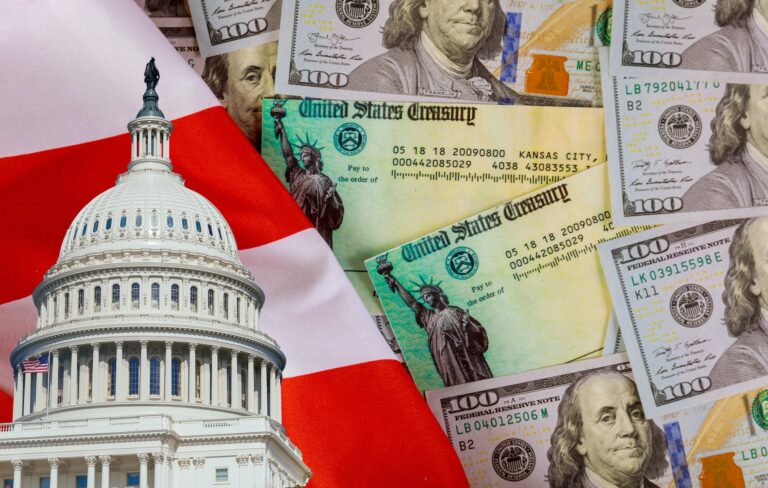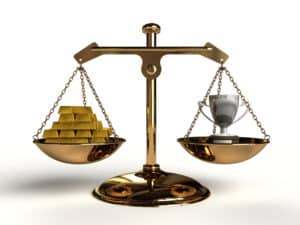The United States and the Dollar have been the cornerstone of the global economy for nearly a century. Its reputation rests on centuries of unwavering commitment to meeting its obligations and global confidence in the US economy. So it goes without saying that the US defaulting on its debt would cause some global turbulence, to say the least.
As the clock ticks and the threat of default draws ever closer, it’s important for investors to understand the gravity of the situation and the potential consequences that could ensue. Keep reading to learn more about the debt ceiling and how a debt default could impact the US.
What Is The Debt Ceiling?
The U.S. debt ceiling is the maximum amount the U.S. government can borrow from the public and other government entities. The debt ceiling is set by Congress and is raised periodically to reflect the government’s borrowing needs. Currently, the ceiling is $31.4 trillion, and given the government’s spending policies, it’s expected to be raised again soon.
It’s important to note that this debt ceiling doesn’t include borrowing by state or local governments. It also doesn’t include outstanding obligations such as Social Security and Medicare benefits that have already been promised to citizens.
Why Has The U.S. Accrued So Much Debt?
Government spending has significantly impacted the growing debt of the United States, as it has consistently spent more than it has collected through taxes over several decades. This increase in spending is due to military and defense spending, infrastructure projects, social programs, and tax cuts for high earners. This additional spending has led to an increased government deficit financed by borrowing from domestic and foreign lenders such as China and Japan.
In addition, the government has made extensive tax cuts over the past decade, reducing the revenue available to fund essential government services and programs but still paying for them in full. This means that the government must borrow more money to make up for these revenue losses, further increasing the debt level. It’s argued that the tax cuts are a major cause of our growing debt.
Economic downturns have also had a significant impact on government debt. As tax revenues decline due to economic spending, the government has less money available to cover its expenses. At the same time, demand for social safety net programs such as unemployment benefits and other forms of assistance has increased, requiring additional borrowing by the government – leading to even greater borrowing needs and increasing debt levels.
What Could Trigger A Debt Default?
The debt ceiling is usually raised in response to major fiscal events, such as wars or recessions, that greatly affect national spending patterns. If Congress doesn’t raise the debt ceiling before the maximum allowable amount is reached, it could result in a “debt default” This means that the U.S. would be unable to pay its loans and may even have difficulty reaching agreements with lenders to obtain more funds when needed.
Political gridlock, in which two or more political parties are unable to reach an agreement on a particular issue, usually results in Congress being unable to make a decision. A debt default would likely have disastrous consequences for domestic and global markets, consumer confidence, and economic activity. It could significantly affect investor sentiment toward U.S. assets and potentially cost taxpayers billions more than if a deal had been reached in time.
Potential Outcomes Of A Debt Default
If the U.S. were to default on its debt, the results could be catastrophic, with long-term effects being felt for decades.
Immediate Impact On Government Functions And Financial Assistance
Government functions that rely on federal funds, such as Social Security payments, Medicare benefits, Medicaid services, and welfare, could all be affected or suspended if the state does not pay its debts. Unemployment benefits could also be stopped altogether if federal reserves are depleted during a potential default, disrupting the lives of those who rely on these programs.
Government-funded projects such as infrastructure repairs and military operations would also be halted until additional funding is secured.
A Ripple Effect On The Global Economy
A default could cause us to slip into a recession, which would cause consumers and businesses to cut back on purchases of international goods and services. This decline in demand would have a particular impact on countries whose incomes depend heavily on exports to the United States.
The expected devaluation of the U.S. dollar would make it more expensive for U.S. companies to purchase abroad and would further restrict international trade. Dollarized economies would also suffer as the value of the U.S. dollar declines.
Countries that have adopted the U.S. dollar as their official currency or whose currencies are pegged to the dollar would face economic instability and possible crises. The weakened dollar could also lead to higher inflation and interest rates in these countries, exacerbating their economic problems.
Downgrade Of The U.S. Credit Rating
The U.S. credit rating could be downgraded if there were a debt default in which financial markets would view lending to the government as riskier and more costly because the government is unable or unwilling to repay its debt.
A lower credit rating would make it harder for other countries and institutions to borrow money, making borrowing more expensive in the future. Borrowing rates could rise across the country as lenders view borrowers as riskier investments.
Stock Market Crash And Potential Loss Of Household Wealth
A collapse of the stock market would not only result in a significant loss of wealth for ordinary investors but would also affect the major financial institutions on Wall Street that hold substantial equity investments. This could severely impact the ability of banks to lend and reduce economic liquidity and growth worldwide.
If the value of stocks were to fall further, companies would be unable or unwilling to make new investments in their operations due to the lack of capital and confidence in the markets, leading to further losses in all industries around the globe.
Protect Your Finances Against A Debt Default With Precious Metals
While it’s nearly impossible to predict if or when a default will occur, there are some strategies you can use to diversify your assets against threats like inflation or a debt default.
Diversifying your portfolio with precious metals, such as gold and silver, offers unique inflationary protection as they have intrinsic value, carry no credit risk, and can’t be inflated. This means that as the purchasing power of paper money declines due to rising prices and devaluation of the currency, gold tends to retain its value better than most investments.
They also can serve as a hedge against inflation since they maintain their value over long periods, even when the values of other investments fluctuate with market conditions. This makes them an appealing choice for investors who want to protect their wealth in case of economic instability or currency devaluation.
Invest In Gold & Silver With Noble Gold Today
As we face these uncertain times and continue to stress about whether our economic future is at stake, it’s crucial to take proactive steps in safeguarding your financial future. Purchasing precious metals or investing in a gold and silver IRA is one way to protect your wealth and secure your retirement.
Want to learn more about buying gold and silver with Noble Gold Investments? Give us a call to speak to one of our customer success team members at (877) 646-5347, or click here to create your account.







